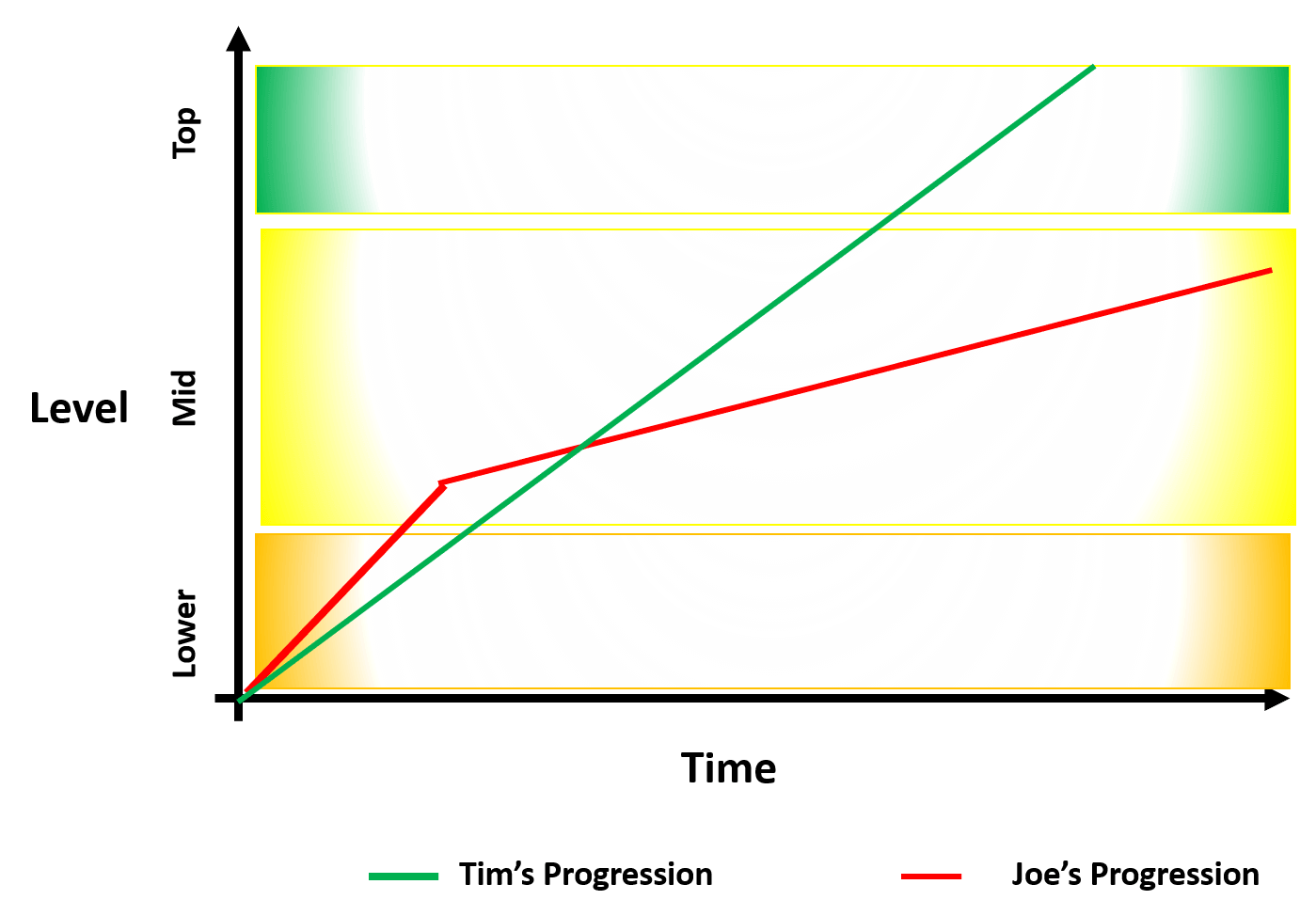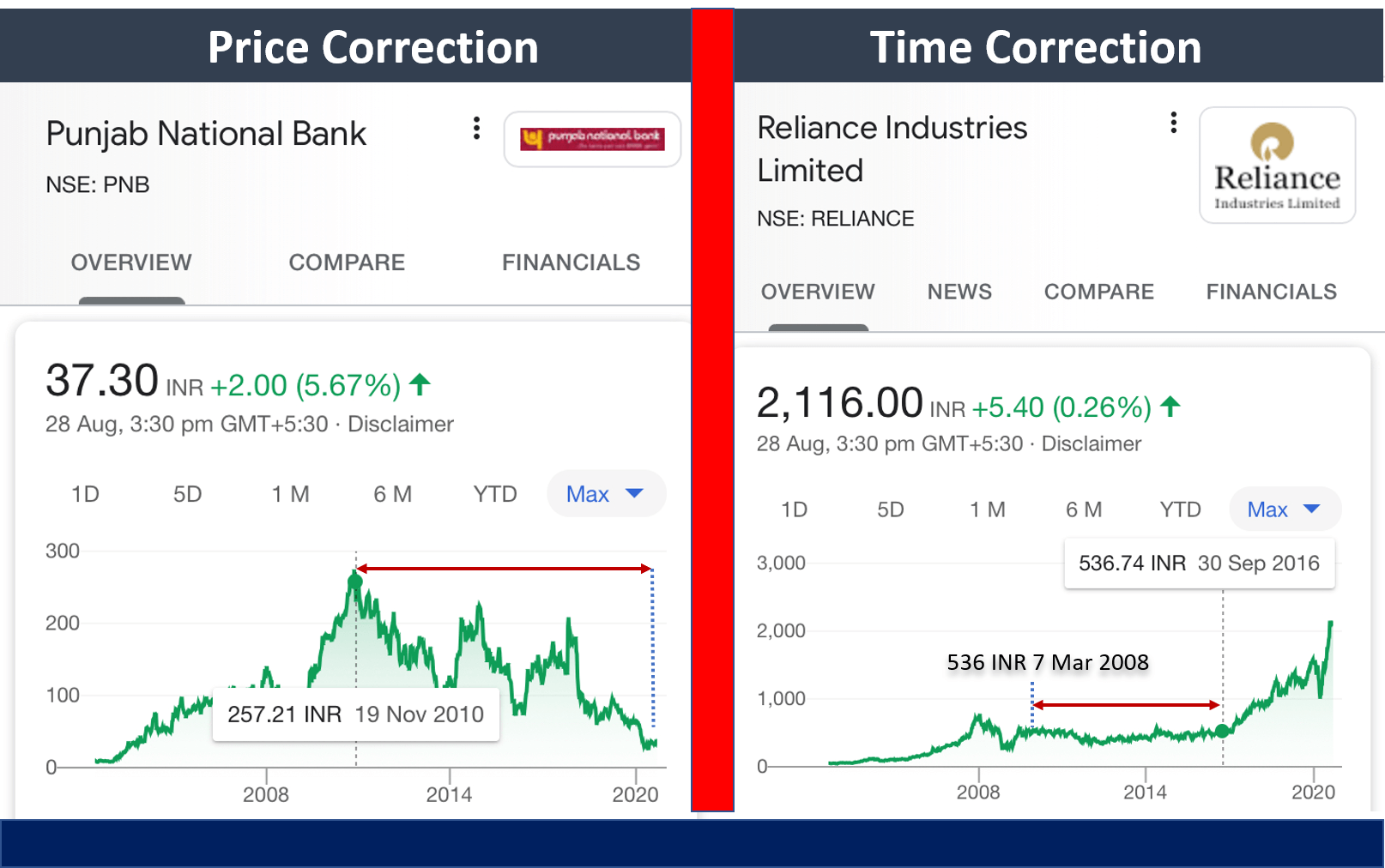Career Growth – Fast Vs. Slow – some basic truths for every professional and for life-in-general.
First -A story!
Early days:
Tim & Joe both started their career in 2001 at the same company. Both had the same degrees, from the same college and even had a lot of resemblance in their families’ backgrounds.
But there is a significant difference in their personalities.
From school days, Tim is a simple, straight-forward hard-working person, happens to dig through things to understand them better, challenges the status quo, and spends 16-18 hours every day on either working on his job or thinking about the various aspects of his work.
On the other hand, Joe is street smart. He is more comfortable with surface-level realities, works through short-cuts, is manipulative with people, and is able to generate equal results as of Tim.
Joe is also very good at deciphering the way the companies work and how careers are shaped. Believes in developing relationships with superiors, goes out of the way to please them, and never tries to challenge their thoughts or strategies, though he may not agree with them.
As a result, Joe is the darling of the organization. He is never grilled too hard on his way of doing things. He gets posting in plum assignments where the company intends to put sufficient resources, there are a lot of low hanging fruits and he can exhibit the results without putting much effort. And because these positions happen to be focus-area of the organization, there are higher chances for him to remain in the limelight.
But Tim has a different career path! He has to go through all the grilling. He challenges the ideas from the seniors, asks tough questions and rebels if he does not get convincing answers. As a result, he is not liked much and is given the toughest assignments to handle. But he is able to survive because he happens to give good results in any kind of environment and always beats the targets given to him.
After 5 Years ( Year 2005) :
Joe is promoted to middle management whereas Tim is still lingering at lower levels despite his excellent performance in difficult assignments!
Year 2020:
Tim left his first job and joined some other large company where he slowly rose through the ranks and became the CEO in 2015. Today he is managing his own multi-million-dollar company.
Whereas Joe is still is at the middle-management level in some not-so-known company. He changed jobs in-between to get some senior position but still could not make it to the top position in any of the big organizations.

What Happened?
Hope you’ve seen similar cases all around you. The people who get early success, many-a-times, lag behind the colleagues who’re considered laggards or losers in the early days!
Why does it happen? Career Growth -Fast vs Slow?
Don’t rush to some easy conclusion! Don’t put it on luck, that majority of people tend to do when they don’t understand the intricacies of certain events.
We would come back to Tim & Joe’s story at the end but let’s first understand an important concept of life.
Price -correction and Time Correction in Stock-Markets:
There is a concept called time correction in the stock market.
First, to understand this concept, let’s first understand how prices of stocks go up or down in the market.
The stock market values a company based on its performance & future growth potential.
Sounds simple?
But it is a little complex than that! The complexity comes from future expectations.
Whereas past performance is there for everyone to see and it is a definite number, the future expectations from a company can vary from person to person.
The future is uncertain for everyone – we can just guess and put some assumptions. And these assumptions are different for different people.
Based on these assumptions, few people have very high hopes from a company while others may not think very highly of the company.
For example, you may feel that all vehicles would start running on battery in the next 10 years and you may rate Tesla at a very high price. On the other hand, whereas your friend may think that it may not happen till 2050 and for him, Tesla may not grow with speed.
On a bigger scale, if most of the stock-purchasers have high expectations from a company, they start buying more & more stocks of the company, and the price increases ( as the number of shares is limited ).On the opposite side, if expectations from a company are low, no one buys the stock, and the price of the share remains low.
But investing in the stock market is not for the short term, people buy stocks for the future with the hope that prices would further go up, they would sell their stocks at a higher level and would make some profits.
The question is whether we can predict the future? Do all assumptions happen to be true?
As everyone knows that this is not the case, there are many ifs and buts when we predict about the future!
What happens when the company does not meet the high expectations of investors? The assumptions of future growth go wrong either because management is incompetent or market for the company’s products does not grow as per assumptions. There might be a case that some disruptive products or technology comes and existing products become irrelevant!
You might say that the stock -prices of the company should fall!
You’re right.
In most of the cases, share prices of those companies fall if they’re not able to meet future projections/expectations/assumptions.
This is called price correction! Prices come down and they settle at the lower level (as per new or no expectations from the company)
But on several occasions, this does not happen as the stock market , like life, does not work in a linear fashion.
In several instances, stock prices don’t fall even if the company does not perform as per expectations. This happens because the majority of investors still believe that the company would be able to meet expectations in some future point of time and many keep holding the stock.
You might see that stock price remains stagnant for many years – it does not go up or down! Would you call this a correction? Many people don’t see it as a correction or fall in the price as on surface level it has not fallen. The value remains unchanged.
However, implicitly investors have lost the time value of money. If the money invested in this company was simply parked in a bank, it would be earning interest and therefore growing at a rate of return higher than zero.
Implicitly the investors have lost money and there has been a correction in the value of the company’s stock price. Since the correction was caused by the passage of time, it is called a “time correction”
To understand it better, have a close look at the following picture :

Punjab National Bank stock had price correction -from 2010 to 2020 – in ten years the stock price has corrected from INR 257 to INR 37.
The company could not meet the expectations and the price has been falling for the last 10 years.
Whereas look at Reliance Industry chart, this company also could not meet the expectations between 2010 to 2018 but the price remained still for 8 years.
This was time correction. An investor who bought Reliance stock in 2010 but kept on holding it could have sold it and could have earned at least 8% interest per annum by depositing the money in the bank. In reality, he also lost money though the stock price did not go down. This happened due to the passage of time.
The resemblance in Life -Tim & Joe :
Time correction has a lot of resemblance in life.
Many people get early successes ( their stock price goes up at the early stage , without much proof of performance) in business as well as in careers. They get better positions, early promotions, early orders.
This may happen due to several reasons:
-A better degree
-Better connections
– Networking and flattery
-Taking short-cuts
But in most of the cases, in the long run, the real talent that is ready to go through the grind comes out as a winner.
Let’s recall Tim & Joe’s journey of life!
What was happening? Tim was trying to understand the concept of everything, he was given tough assignments that made him learn more, he was always trying to find the better alternatives by questioning the status -quo and was not afraid of taking risks of antagonizing the seniors where he was not in agreement with them.
Whereas Joe was taking an easy route – short-cuts for immediate success, pleasing seniors, and getting easy and lucrative assignments, friendly reviews. He did not go through the drill. People like Joe are successful early in their careers or in the jobs where by luck or design they don’t have to face tough conditions or in the positions where you just need to follow orders and all blame/credit goes to the seniors.
But these people happen to struggle when they come across situations where tough decisions need to be taken, where the future is uncertain and calculated risk-taking is necessary. They may reach in these positions but they may either be removed from those assignments (price-correction) or they don’t grow further beyond that and they remain stagnant at certain levels (time correction).
The following graph would give clear depiction about Tim & Joe’s career

Although Tim took more time to reach the middle level, not only he did well in new roles but he could get further growth due to his attitude and work habits.
Joe got stuck somewhere in the middle-level because of his overdependence on his degree, too much of trust in his networking abilities. His focus and energy were directed to pleasing the bosses and bringing results in any way.
His nature of taking short-cuts could not take him further as he always tried to avoid the grind. He had only surface knowledge of the field, never tried to dirty his hands in digging deep, just followed orders with none of his original thoughts.
Many people get stuck or spend a lot of time after the first or second promotion or after they take their business/company to a certain level.
But beyond a certain level, they start struggling and don’t get a further promotion (time -correction ) or they’ve to leave the company due to non-performance at that level (price-correction).
Price -correction (demotion, losing the job ) or time-correction (growth becomes stagnant) happens with those people who get their first/second promotion without much effort like Tim.
Tim went through a process called “an apprenticeship”.
Robert Greene, in his book, Mastery, emphasizes the necessity of completing apprenticeship for greater success or achieving mastery in any field.
As per him, an apprenticeship has 3 steps :
Step 1: Deep observation — the passive mode
“The greatest mistake you can make in the initial months of your apprenticeship is to imagine that you have to get attention, impress people, and prove yourself. These thoughts will dominate your mind and close it off from the reality around you.”
You start by observing who is doing well in the field and trying to learn rules and strategies through your observation of them.
Step 2: Skill acquisition — the practice mode
“First, it is essential that you begin with one skill that you can master, and that serves as a foundation for acquiring others. You must avoid at all cost the idea that you can manage learning several skills at a time. You need to develop your powers of concentration, and understand that trying to multitask will be the death of the process.”
“Second, the initial stages of learning a skill invariably involve tedium. Yet rather than avoiding this inevitable tedium, you must accept and embrace it. The pain and boredom we experience in the initial stage of learning a skill that toughens our minds, much like physical exercise. Too many people believe that everything must be pleasurable in life, which makes them constantly search for distractions and short-circuits the learning process.”
Greene emphasizes the importance of focus and deep work (deliberate practice):
“This process of hardwiring cannot occur if you are constantly distracted, moving from one task to another. In such a case, the neural pathways dedicated to this skill never get established; what you learn is too tenuous to remain rooted in the brain. It is better to dedicate two or three hours of intense focus to a skill than to spend eight hours of diffused concentration on it. You want to be as immediately present to what you are doing as possible.”
He also mentions the 10,000-hour rule as the “gold standard” for how long it takes in practice to reach expertise.
Step 3: Experimentation — the active mode
As you gain more skill and understanding, you must move into the active mode where you take the skill and apply it yourself. You have to break out of just following the rules and start creating new works on your own.
There are high chances that if someone goes through all these steps in early stage of career, he would emerge as a winner.
Hindu Astrology, Saturn planet, and Time Correction:
As per Hindu astrology, we all get influenced by planets. These planets keep transiting in our life during different periods depending upon our date of birth.
One of the planets is Saturn (Shani). It is considered a planet of justice and it happens to visit everyone’s life after a gap of every 22 ½ years.
Saturn, the lord for hard work, discipline, old age, and authority, will show results based on how the individual has lived his/her life up in the last 22 ½ years.
If the person has been disciplined, and worked hard but was not getting credit for his hard work, this is the moment Saturn shows its rewards.
On the other hand, if a person is lazy and is taking short-cuts or is adopting unethical ways, he would be punished by Saturn.
Saturn looks at all aspects of life – health, wealth, relationships as well as positions.
Hence in a way, Saturn is the time-correction god.
If someone has been having all good things without having real talent or without putting enough work or is not paying attention to health/relationships, at the time of Saturn transit ( 22 ½ years), he would go through the time correction. Similar would be the result of the opposite case.
Career Growth -Fast Vs. Slow Summary :
In short, we can say that if you have not gone through a drilling apprenticeship period, you may get some initial success but in the long run, you might lose the race via price or time correction ( even gods take note of it and would reprimand you)
Some additional facts:
Indian actor, Amitabh Bachchan got his first big hit during Saturn visit, the same is true for Bal Thakrey (Indian politician) became popular when Saturn was passing through his life. Even Michael Jackson’s most successful stint as an international celebrity can be rooted in his Saturn period.
Exceptional Joes: Sometimes due to planetary positions, you may find people like Joe also on the top level – but look closely! You would find that either the company is struggling to grow or Joe is too dependent on others to run the show. And sometimes the Joes end up at the top in smaller organizations but they are unable to make any significant mark in life.
Hope this article on ‘Career Growth -Fast Vs. Slow’ helped you! If yes, please share it with others by pressing the “Tell Others” button on the left-hand side.
If you wanna improve your career and if you also like to read books, here is a suggestion for you ‘So Good That They Can’t Ignore You’
If you want to read somenthing more, would suggest you to click on this link ‘You Must Do Boring Things’
38 claps





Very nicely articulated article enjoyed reading and is realistic too
Sir, Very knowledgable article With real and holistic approach
Superbly Explained article . The analogy of price correction and time correction of Share Market with career and Life is very convincing and sounds logical .
Really good read
Very insightful!
It’s really a life learning lesson which gives motivation to the people to stick on the basic principles.
Sir, all your articles leave some food for thought. This story again proved ” perseverance pays” and there is no alternative of hard work. Short cut gives result at short term but not for long term.